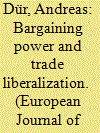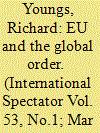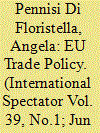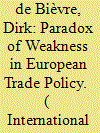|
|
|
Sort Order |
|
|
|
Items / Page
|
|
|
|
|
|
|
| Srl | Item |
| 1 |
ID:
085400


|
|
|
|
|
| Publication |
2008.
|
| Summary/Abstract |
Shortly after the creation of the European Economic Community (EEC, 1958), European countries accepted a far-reaching liberalization of their previously fairly protectionist external trade relations. I provide an explanation of this astonishing development that builds on the argument that the establishment of a customs union increases the bargaining power of its member countries in international trade negotiations. When facing discrimination from a customs union, exporters in excluded countries have an incentive to become politically active and lobby their governments for relief. This increase in exporter lobbying, in turn, weakens the negotiating position of excluded countries in international trade negotiations by making them more eager to achieve a negotiated agreement that lowers the external barriers of the customs union.
|
|
|
|
|
|
|
|
|
|
|
|
|
|
|
|
| 2 |
ID:
158385


|
|
|
|
|
| Summary/Abstract |
Politicians, diplomats and analysts commonly assume that commitment to multilateralism and liberal norms is part of the EU’s very DNA. Increasingly, however, the EU’s commitment to the liberal global order is more selective. We demonstrate the shift to a more contingent liberalism by examining the EU’s recent record in relation to four different challenges: international trade; US leadership; Russian actions in the eastern neighbourhood; and security in the Middle East. We speculate on what this may portend for the EU’s self-identity, European interests and the integrity of the prevailing global order.
|
|
|
|
|
|
|
|
|
|
|
|
|
|
|
|
| 3 |
ID:
180071


|
|
|
|
|
| Summary/Abstract |
European Union (EU) trade policy has appeared rather contradictory recently towards countries in which there are instances of human rights violations, such as Vietnam and Cambodia. Given that principled pragmatism, set down in the 2016 EU Global Strategy, entails the view that the EU approach must fit the reality of EU interests, it is a useful lens for explaining why the EU treats its trade partners differently. This is important in view of the EU’s evolving foreign and security policy in the Southeast Asian region and its distinctive economic, security and strategic interests in Vietnam and Cambodia.
|
|
|
|
|
|
|
|
|
|
|
|
|
|
|
|
| 4 |
ID:
160901


|
|
|
|
|
| Summary/Abstract |
Over the last decade, trade negotiations with Canada and the United States met with considerable resistance from non-governmental organisations (NGO). Moreover, the negotiation mandates given to the European Commission were so broad as to include topics falling under so-called mixed competence of the EU and the member states, necessitating not only ratification by the EU Council of Ministers and the European Parliament, but also member states’ parliaments. At some point, these two factors almost seemed to paralyze the EU as a trade negotiator. In the end, however, the EU concluded an agreement with Canada, renegotiated its agreement with Mexico (while also concluding agreements with Singapore and Japan amongst others), while negotiations with the US were suspended. Three factors can account for this puzzling combination of apparent incapacity and blockage and surprising resilience of EU trade policymaking. First, the NGO contestation campaigns did not muster pan‐European but rather only varying degrees of support. Second, in addition to scrutiny by the European Parliament, consensus decision-making in the Council fosters accommodation of the demands of all member states. This leads to a low degree of negotiating autonomy on the part of the European Commission, yet large bargaining power for the European Union, as long as the other side wants agreement. Finally, a recent ruling by the Court of the EU facilitated the decoupling of agreements on portfolio investment and investment arbitration (one of the most difficult hurdles), from all other matters of trade and regulatory cooperation, making it easier to reach agreement.
|
|
|
|
|
|
|
|
|
|
|
|
|
|
|
|
| 5 |
ID:
159601


|
|
|
|
|
| Summary/Abstract |
Negotiations on the Transatlantic Trade and Investment Partnership (TTIP) commenced in 2013, and soon became the most controversial bilateral trade agreement negotiations ever attempted by the European Union (EU). When trying to understand the escalating debate over the proposed agreement, most analyses have highlighted opposition to the deal, especially from civil society organizations. However, a full understanding of the debate surrounding TTIP requires analysis of supporters’ responses, as these changed in response to strategies used by opponents of the agreement. This article uses a novel approach in trade policy scholarship—rhetorical analysis—to focus on the European Commission Trade Directorate’s response to contestation over TTIP. Drawing on work on the ‘rhetoric of reaction’, this article identifies the rhetorical strategies used by EU trade commissioners from 2013 to 2016. It outlines the evolution of the rhetoric and accompanying changes in process and policy, providing insights on the impact of TTIP politicization on the guiding principles of the EU’s trade policy.
|
|
|
|
|
|
|
|
|
|
|
|
|
|
|
|
| 6 |
ID:
163650


|
|
|
|
|
| Summary/Abstract |
Although stalled since 2016, the negotiations on a Transatlantic Trade and Investment Partnership (TTIP) have had major unintended consequences. The TTIP led to demands from third countries to upgrade their trade relationship with the EU and to unprecedented politicisation. As second-order effects of the latter, it endangered the EU-Canada trade agreement and brought about reform of EU trade governance and amendments to EU trade policy positions. These unintended consequences occurred because of inflated expectations about and insufficient awareness of the different nature of TTIP with regard to scope and partner compared to other trade negotiations. In the meantime, EU trade policy has adapted to the new politics of trade, making unintended consequences less likely.
|
|
|
|
|
|
|
|
|
|
|
|
|
|
|
|
|
|
|
|
|